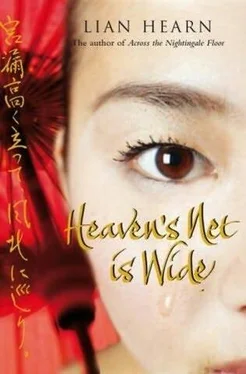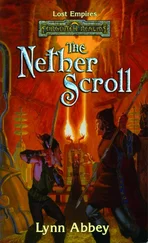“In Heaven’s name,” Matsuda said. “You gave me tea made by one of the Tribe? I’m lucky to be still alive.”
Shigeru thought of poison, thought of the signs he himself had seen of someone searching for aconite and arum, this man or someone like him.
“I’m a fool,” he said. “For some reason, I thought I could trust him.”
“You are too quick to trust,” Matsuda rejoined. “Still, it seems on this occasion no harm was done. That brew is a very effective painkiller. I’d like to know what’s in it.”
“He knew your name.”
“I don’t want to boast-a lot of people know my name. I am not popular with the Tribe. I’ve tried to keep them out of the temple. I don’t like spies. Did he use invisibility?”
Shigeru nodded. “How is it done?”
“It’s a trick, a way of moving that fools the eyes of the watcher. You can’t teach it-it’s inborn, like most of their skills. Training enhances them. From what I’ve heard, a lot of it is like meditation, emptying the mind and concentrating, though the Tribe use cruelty as a teaching tool to silence the conscience and eradicate compassion. They say that the Iida family use some of these methods with their sons, and that Sadamu in particular has benefited from them.”
“The Sadamu that also hoped to learn from you!” Shigeru said.
“Ah, I would never have gone to Inuyama. I don’t like the climate. Anyway, I don’t have to now. I am content with my Otori pupil. In fact, I’m very proud of you.”
“Even though I did everything wrong afterward! In the moment I overcame you, I saw you as a traitor,” Shigeru confessed. “I thought you were part of a conspiracy… It’s too stupid to think about.”
“I was pushing you as hard as I could. I knew there was more in you than you had allowed me to see till now. You have a trusting nature, Lord Shigeru; it’s a virtue but only up to a point. Now you know how to unleash your true power, through suspicion of betrayal and the pure rage that came from it. You can practice on your own today. You have to summon up by will what you discovered through emotion. I am going to rest.”
“We should return to the temple,” Shigeru said, looking at his teacher’s pale face and the growing bruise. “They can take care of you there.”
“It’s not time yet,” Matsuda replied. “I’ll rest for a couple of days; we will spend the Festival of the Dead here and return to the temple before the autumn storms, unless I am summoned earlier. Our Abbot’s health is fragile, as you know. If he should die, I would have to return at once.
“Now we have talked for far too long. We will spend the rest of the day in silence. You can prepare a little soup and then begin your exercises.”
There were many things Shigeru longed to talk about: his thoughts were chasing one another around in his mind. He realized he craved praise, reassurance, and knew that Matsuda had already given him as much as he was going to. He opened his mouth to say, “Just one more question,” but Matsuda silenced him. “I suggest meditation first, to still your thoughts.”
While he meditated, he looked dispassionately at his actions, seeking to learn from them. He recognized the ability that lay behind his swordplay, as clearly as he saw the immaturity of character that had led to his panic and confusion. Gradually his thoughts calmed, his mind emptied.
In the evening he went out to collect mushrooms for the meal, half hoping to see the man from the Tribe again-the Fox, he thought, smiling. So the Fox roamed these mountains, collecting herbs for medicine and poison. His curiosity had been aroused as much by the man himself as by the mysteries of the Tribe.
I’ll know him if I see him again, he told himself, and felt they would meet again, as if there were some bond between them from a former life. I must find out more about the Tribe, maybe even use them, as the Tohan do.
However, he did not see the Fox again; nor were there any signs of the man’s presence. Matsuda recovered and resumed their daily combats. Shigeru learned to use his newfound strength with greater accuracy; he frequently dominated his teacher but never again struck him so hard.
They spent the days of the Festival of the Dead in fasting and meditation. It was the first time Shigeru had spent this solemn festival away from his family. His father alternated visits to the temples of Tokoji and Daishoin in Hagi and to Yamagata and Terayama. This year he would stay in Hagi. Shigeru pictured his brother and their friends setting lanterns adrift in paper boats on the river, watching the tide take them far out to sea. He saw the view of the bay, the islands rising jagged from the water, lanterns casting their gold light in the blue haze, and felt a pang of homesickness for the place he loved so much.
The forest around him was no less beautiful: he had come to love it, too, as he explored it more, knowing it better; but it was lonely, empty of humankind, and on the nights when the dead revisit the living, it seemed even more solitary.
Lights glimmered in the distance where the villagers lit huge fires to show their dead the way home. Shigeru also made a fire outside the hut, but he did not expect to see his ancestors. They would be where their graves were, in Hagi or at Terayama. Not even the dead would visit them here.
He and Matsuda had hardly spoken for days: combat, exercise, meditation, and the daily chores had all been conducted in silence. So on the second night of the festival Shigeru was surprised when, instead of sleeping immediately after the evening meal, Matsuda told him to light the lamp and make fresh tea.
“We will talk for a while.”
They moved outside onto the small veranda. It was a clear night: the Bear and the Hunter blazed above their heads. Shigeru fetched fresh water and lit an oil lamp with a wood shaving from the fire. He served his teacher and then sat cross-legged on the floor, waiting to hear what Matsuda had to say to him.
“You had many questions before,” Matsuda said. “You may ask them now.”
“I have been thinking about the dead,” Shigeru said. “Are they reborn immediately or do their spirits live on? They revisit us each year-where do they dwell in between? When we worship our ancestors, do they see and hear us?”
“We revere our ancestors as if they still lived,” Matsuda replied. “And we treat all living things with compassion, for into them our own ancestors might have been reborn. The fate from our past lives influences our present life, just as this life will influence our future. We can escape the cycle of birth and death by following the teachings of the Enlightened One. But you are called to another path; you will be the head of an ancient and powerful clan. The safety and well-being of many will lie in your hands. You have to live in the world with all its deceptions and dangers.
“It is no small thing to be born Otori. Your family are the most illustrious in the Three Countries, whatever the Iida may think of themselves. Your lineage is the most ancient: you share the blood of the imperial family. The strengths of your family are courage, compassion, warmth of feeling, fair-mindedness; their weaknesses are recklessness, softheartedness, infatuation, and indecision.”
“Each weakness is the shadow of each strength,” Shigeru said quietly.
“Yes, indeed. You must see how your father’s sense of justice too often leads him into indecisiveness. He sees everyone’s point of view and wants to appear fair to them all. Possibly he cares too much about what people think of him. He desires his brothers’ good opinion-in return, they despise him.”
“Are they also traitors?”
“I believe they would be if they had more courage.”
“If the Tohan are preparing for war, how can we protect the Middle Country?”
Читать дальше












